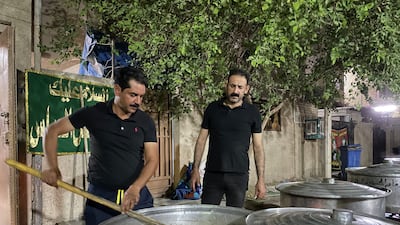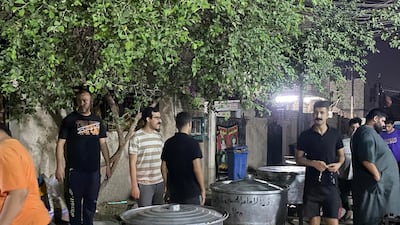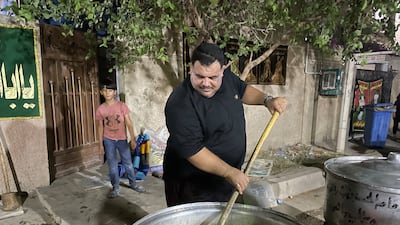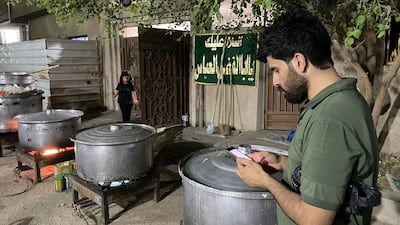It is that time of the year again in Iraq. The aroma of ceremonial food cooked slowly in large pots over a wood fire wafts through the air in several cities.
It is Muharram, the first month of the Islamic calendar, a time that Shiites mark with different rituals.
The 10th of Muharram in 680AD marked the death Prophet Mohammed’s grandson, Imam Hussein bin Ali, outside the city of Karbala in modern-day Iraq.
Shiites mark the occasion each year by serving free food to mourners, pilgrims and neighbours.
That food is meant as a blessing for the soul of Imam Hussein and Shiites also ask forgiveness, to atone for their own sins.
Although the event is observed in several countries, the mourning period in Iraq is different.
It is not confined to the 10th day, known as Ashura, but lasts until the middle of the following month of Safar, to mark Arbaeen, which means 40 in Arabic. The traditional length of mourning is 40 days.
Several dishes are prepared for this occasion, but the main meal is the timman and qeema, or rice with a thick stew of chickpeas and diced meat.
“People from all backgrounds seek blessing in these meals,” Ali Hameed, a chef from Baghdad’s Shiite district of Kadhimiya, told The National.
“Those who cook or eat, whether poor or rich, seek blessings and forgiveness in these dishes, as well as other rituals."
People from all background seek blessing in these meals
Ali Hameed
Cooking qeema requires many steps and a collective effort.
The meat and chickpeas are boiled separately, before being mixed in a vat without water. The soft mixture is fried, with fat and wedges of onion added.
When the onion and meat turn a dark golden brown, boiled water is added to start the most important step: stirring and mashing.
The mixture is cooked for hours, with tomato juice and paste, salt and ground dried lime added, as well as spices such as cinnamon, cardamom, cubeb, cloves, cumin and black pepper.
Long-grain rice, preferably basmati, is cooked in other pots. Before it is cooked completely, saffron is added and the rice is covered without stirring. When it is cooked, it is stirred and served.
Qeema varies depending on where it is cooked and there are three types in Iraq, Mr Hameed said. What makes them different is the amount of ingredients and the way they are cooked, which affects the thickness and taste slightly.
The most famous is prepared in the southern province of Najaf, where cooks mainly use beef or camel meat, with the bones, and whole chickpeas. The recipe requires equal amounts of meat and chickpeas mashed together.
The type cooked in Kadhimiya is a mixture of mutton and beef, with split chickpeas. The meat is half the amount of the chickpeas and the ingredients are stirred instead of mashed.
The third kind is affiliated with Karbala which is closer to Kadhimiya’s stew.
The three areas are home to revered Shiite shrines.
Another famous meal is harissa, a stew of wheat and lamb. Like qeema, harissa is slowly cooked until it reaches the consistency of porridge. When served, it is topped with cinnamon, sugar and hot fat.
Other meals are sometimes served, or people are simply offered tea and cookies, but it is always free of charge.
It is not known why qeema and harissa are associated with Muharram.
Some have suggested the plight of Imam Hussein provides the inspiration and there is a theory that, during the battle, his brother Abbas tried to bring water from the Euphrates, only for his water hide to be pierced with an arrow.
The word qeema could be traced back even further because it means “finely chopped” in the ancient Akkadian language.
Ancient culinary history
The world’s oldest cookbooks were discovered in Iraq in the last century. Three clay tablets, written in cuneiform script and dating to about 1700 BC, are now housed at the Babylonian Collection of Yale University.
They give cooking instructions for more than two dozen Mesopotamian dishes, including stews made of lamb or pigeon meat, a turnip dish and a kind of poultry pie.
Culinary arts flourished when Baghdad was the capital of the Abbasid Caliphate from the eighth to 13th centuries and many cookbooks have been preserved from that period.
For the fourth consecutive year, Safa Karim and his neighbours in the Ghazaliya district of Baghdad have donated money to fund the cooking of meals for Muharram.
This year, they raised about 1.75 million Iraqi dinars ($1,200). Eight pots were placed in a street as young Shiite men dressed in black stirred the ingredients in a process that takes about seven hours.
Posters of Imam Hussein and black banners, some calligraphed with Islamic slogans, were draped on the houses and hung across the street as chants mourning and glorifying the Imam blaring from loudspeakers.
“By commemorating the death of Imam Hussein and sharing the sorrow with the Prophet Mohammed’s family, we are trying to be close to them and to seek their intercession,” said Mr Karim, 43.
When Muharram begins, Iraqis bring small pots to places that meals are cooked.
That passion inspired Muntadhar Hussein to start his timman and qeema in Ghazaliya Facebook group in 2020. It keeps residents updated with news on gatherings in the sprawling district and now has about 6,000 followers.
“The aim is to help the poor find out the locations and to help our brothers, the Sunnis, who love eating qeema,” Mr Hussein, 26, told The National.
“This is the month of the poor and those with limited incomes."
What is an ETF?
An exchange traded fund is a type of investment fund that can be traded quickly and easily, just like stocks and shares. They come with no upfront costs aside from your brokerage's dealing charges and annual fees, which are far lower than on traditional mutual investment funds. Charges are as low as 0.03 per cent on one of the very cheapest (and most popular), Vanguard S&P 500 ETF, with the maximum around 0.75 per cent.
There is no fund manager deciding which stocks and other assets to invest in, instead they passively track their chosen index, country, region or commodity, regardless of whether it goes up or down.
The first ETF was launched as recently as 1993, but the sector boasted $5.78 billion in assets under management at the end of September as inflows hit record highs, according to the latest figures from ETFGI, a leading independent research and consultancy firm.
There are thousands to choose from, with the five largest providers BlackRock’s iShares, Vanguard, State Street Global Advisers, Deutsche Bank X-trackers and Invesco PowerShares.
While the best-known track major indices such as MSCI World, the S&P 500 and FTSE 100, you can also invest in specific countries or regions, large, medium or small companies, government bonds, gold, crude oil, cocoa, water, carbon, cattle, corn futures, currency shifts or even a stock market crash.
Terminal High Altitude Area Defense (THAAD)
What is THAAD?
It is considered to be the US' most superior missile defence system.
Production:
It was first created in 2008.
Speed:
THAAD missiles can travel at over Mach 8, so fast that it is hypersonic.
Abilities:
THAAD is designed to take out projectiles, namely ballistic missiles, as they are on their downward trajectory towards their target, otherwise known as the "terminal phase".
Purpose:
To protect high-value strategic sites, such as airfields or population centres.
Range:
THAAD can target projectiles both inside and outside of the Earth's atmosphere, at an altitude of 93 miles above the Earth's surface.
Creators:
Lockheed Martin was originally granted the contract to develop the system in 1992. Defence company Raytheon sub-contracts to develop other major parts of the system, such as ground-based radar.
UAE and THAAD:
In 2011, the UAE became the first country outside of the US to buy two THAAD missile defence systems. It then deployed them in 2016, becoming the first Gulf country to do so.
LA LIGA FIXTURES
Friday (UAE kick-off times)
Levante v Real Mallorca (12am)
Leganes v Barcelona (4pm)
Real Betis v Valencia (7pm)
Granada v Atletico Madrid (9.30pm)
Sunday
Real Madrid v Real Sociedad (12am)
Espanyol v Getafe (3pm)
Osasuna v Athletic Bilbao (5pm)
Eibar v Alaves (7pm)
Villarreal v Celta Vigo (9.30pm)
Monday
Real Valladolid v Sevilla (12am)
RESULTS
5pm: Wathba Stallions Cup Maiden (PA) Dh 70,000 (Dirt) 1,600m
Winner: Samau Xmnsor, Abdul Aziz Al Balushi (jockey), Ibrahim Al Hadhrami (trainer)
5.30pm: Maiden (PA) Dh 70,000 (D) 1,600m
Winner: Ottoman, Szczepan Mazur, Abdallah Al Hammadi
6pm: Maiden (PA) Dh 70,000 (D) 1,800m
Winner: Sharkh, Patrick Cosgrave, Helal Al Alawi
6.30pm: Handicap (PA) Dh 85,000 (D) 1,800m
Winner: Yaraa, Fernando Jara, Majed Al Jahouri
7pm: Handicap (PA) Dh 70,000 (D) 2,000m
Winner: Maaly Al Reef, Bernardo Pinheiro, Abdallah Al Hammadi
7.30pm: Maiden (PA) Dh 70,000 (D) 1,000m
Winner: Jinjal, Fabrice Veron, Ahmed Al Shemaili
8pm: Handicap (PA) Dh 70,000 (D) 1,000m
Winner: Al Sail, Tadhg O’Shea, Ernst Oertel
MATCH INFO
Sheffield United 3
Fleck 19, Mousset 52, McBurnie 90
Manchester United 3
Williams 72, Greenwood 77, Rashford 79
Killing of Qassem Suleimani
pakistan Test squad
Azhar Ali (capt), Shan Masood, Abid Ali, Imam-ul-Haq, Asad Shafiq, Babar Azam, Fawad Alam, Haris Sohail, Imran Khan, Kashif Bhatti, Mohammad Rizwan (wk), Naseem Shah, Shaheen Shah Afridi, Mohammad Abbas, Yasir Shah, Usman Shinwari
NINE WINLESS GAMES
Arsenal 2-2 Crystal Palace (Oct 27, PL)
Liverpool 5-5 Arsenal (Oct 30, EFL)
Arsenal 1-1 Wolves (Nov 02, PL)
Vitoria Guimaraes 1-1 Arsenal (Nov 6, Europa)
Leicester 2-0 Arsenal (Nov 9, PL)
Arsenal 2-2 Southampton (Nov 23, PL)
Arsenal 1-2 Eintracht Frankfurt (Nov 28, Europa)
Norwich 2-2 Arsenal (Dec 01, PL)
Arsenal 1-2 Brighton (Dec 05, PL)
Racecard
6.30pm: The Madjani Stakes (PA) Group 3 Dh175,000 (Dirt) 1,900m
7.05pm: Maiden (TB) Dh165,000 (D) 1,400m
7.40pm: Maiden (TB) Dh165,000 (D) 1,600m
8.15pm: Handicap (TB) Dh190,000 (D) 1,200m
8.50pm: Dubai Creek Mile (TB) Listed Dh265,000 (D) 1,600m
9.25pm: Handicap (TB) Dh190,000 (D) 1,600m
The National selections
6.30pm: Chaddad
7.05pm: Down On Da Bayou
7.40pm: Mass Media
8.15pm: Rafal
8.50pm: Yulong Warrior
9.25pm: Chiefdom
GAC GS8 Specs
Engine: 2.0-litre 4cyl turbo
Power: 248hp at 5,200rpm
Torque: 400Nm at 1,750-4,000rpm
Transmission: 8-speed auto
Fuel consumption: 9.1L/100km
On sale: Now
Price: From Dh149,900
Results
Men's finals
45kg:Duc Le Hoang (VIE) beat Zolfi Amirhossein (IRI) points 29-28. 48kg: Naruephon Chittra (THA) beat Joseph Vanlalhruaia (IND) TKO round 2.
51kg: Sakchai Chamchit (THA) beat Salam Al Suwaid (IRQ) TKO round 1. 54kg: Veerasak Senanue (THA) beat Huynh Hoang Phi (VIE) 30-25.
57kg: Almaz Sarsembekov (KAZ) beat Tak Chuen Suen (MAC) RSC round 3. 60kg: Yerkanat Ospan (KAZ) beat Ibrahim Bilal (UAE) 30-27.
63.5kg: Abil Galiyev (KAZ) beat Nouredine Samir (UAE) 29-28. 67kg: Narin Wonglakhon (THA) beat Mohammed Mardi (UAE) 29-28.
71kg: Amine El Moatassime (UAE) w/o Shaker Al Tekreeti (IRQ). 75kg: Youssef Abboud (LBN) w/o Ayoob Saki (IRI).
81kg: Ilyass Habibali (UAE) beat Khaled Tarraf (LBN) 29-28. 86kg: Ali Takaloo (IRI) beat Emil Umayev (KAZ) 30-27.
91kg: Hamid Reza Kordabadi (IRI) beat Mohamad Osaily (LBN) RSC round 1. 91-plus kg: Mohammadrezapoor Shirmohammad (IRI) beat Abdulla Hasan (IRQ) 30-27.
Women's finals
45kg: Somruethai Siripathum (THA) beat Ha Huu Huynh (VIE) 30-27. 48kg: Thanawan Thongduang (THA) beat Colleen Saddi (PHI) 30-27.
51kg: Wansawang Srila Or (THA) beat Thuy Phuong Trieu (VIE) 29-28. 54kg: Ruchira Wongsriwo (THA) beat Zeinab Khatoun (LBN) 30-26.
57kg: Sara Idriss (LBN) beat Zahra Nasiri Bargh (IRI) 30-27. 60kg: Kaewrudee Kamtakrapoom (THA) beat Sedigheh Hajivand (IRI) TKO round 2.
63.5kg: Nadiya Moghaddam (IRI) w/o Reem Al Issa (JOR).
War 2
Director: Ayan Mukerji
Stars: Hrithik Roshan, NTR, Kiara Advani, Ashutosh Rana
Rating: 2/5
Volvo ES90 Specs
Engine: Electric single motor (96kW), twin motor (106kW) and twin motor performance (106kW)
Power: 333hp, 449hp, 680hp
Torque: 480Nm, 670Nm, 870Nm
On sale: Later in 2025 or early 2026, depending on region
Price: Exact regional pricing TBA





